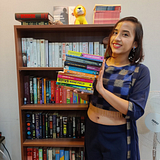What Happens When You Read More Than One Book at the Same Time
Lessons from a life of reading multiple books at once.

Lessons from a life of reading multiple books at once.
If you look at my 2022 Goodreads challenge, you’d see that I’m currently reading four books.
- Galileo’s Error: Foundations for a New Science of Consciousness by Philip Goff (Philosophy, panpsychism).
- The Marriage by K L Slater (Psychological thriller).
- No Rules Rules: Netflix and the Culture of Reinvention by Reed Hastings (Entrepreneurship).
- Red River, Blue Hills by Ankush Saikia (Murder mystery).
If that made you roll your eyes and go, “There’s no way she’s going to get any value out of them,” let me remind you that I write detailed reviews for each book I read. I also bookmark and store important quotes and ideas so I can use them later as needed.
In short, I remember the important things from every book I read.
But this article is not about getting the most out of your reading habit. This article discusses the pros of reading multiple books at once and lays down three important lessons I learned from this unique habit.
This is one of the rare scenarios where “cheating” is not only allowed, but also encouraged, albeit with a book!
1. It Helps if the Books Are in Different Formats and Genres
As I’ve written before, having your books in different formats and belonging to different genres helps you retain more information and feel even more deeply connected with the plot(s).
I’ve found some genre-format combinations that help me retain more information. Here’s how I usually apply them:
Paperbacks are for highlighting
I read non-fiction in paperback format. This helps me highlight the important passages and bookmark parts I found useful. This way, I can come back to the book later and go through the bits that stuck to me the most.
Ebooks are for highlighting too — just digitally
On my e-reader, I read literary fiction, fantasy, classics, or magical realism. These are the genres that use typically use the most beautiful prose, making my heart flutter at all the ways language can speak to me.
The best part about using technology to read is that every sentence or passage I highlight ends up in my repository of quotes on Goodreads. That way, whenever I’d like to come back to a sentence that particularly moved me, all I need to do is search a few keywords I remember on Goodreads quotes, and I’ll have the passage right in front of me.
Audiobooks are for losing yourself in the story
Audiobooks were hard for me to get into as a beginner, but I found that really compelling stories make it easier to stick with them until the end. All you have to do is plug in your earphones while doing some menial chore, play an audiobook, and lose yourself in the story.
I usually listen to stories that flow amazingly well and can hold my interest. Of course, the narrator has to be fantastic too. The genres I prefer to read as audiobooks are — psychological thrillers and murder mysteries. I’ve also started listening to fantasy fiction that’s fairly easy to follow, and have found some amazing results.
I’ve listed my favorite audiobook recommendations here.
Mixing up is fun
While I mentioned these genre-format combinations, it’s important to add that I don’t necessarily stick to them all the time.
There are so many great non-fiction books, primarily memoirs narrated by the authors themselves, that I’ve listened to on audio. I’ve also read several whodunnits as paperbacks and never regretted them.
The key here is to enjoy each book you read and make sure you’re getting some value out of it. The idea behind having three books of different genres in different formats is that their premise needs to be so different, that you don’t mix one up with another.
2. You Have a Bigger Attention Span Than You Give Yourself Credit For
When I started listening to audiobooks, I didn’t think a time like now would come when I can say I’ve finished more than 60 audiobooks in about two years. I thought I’d get distracted and lose track of the story.
Well, spoiler alert: I was wrong.
This intense love for books has made me realize that I can listen to an audiobook for hours and not lose focus.
I also first thought that reading more than one book at a time would confuse me. Sure, that happened at times when I was reading two books having the same “vibe” or belonging to the same genre. But other than that, I’ve found that reading multiple books at the same time doesn’t diminish my capacity to retain them at all. Here are some other interesting lessons I learned:
- If I find one book too “heavy,” I can always keep it aside for the time being and move on to something else.
- Alternatively, knowing I have the option to immerse myself in a completely different world helps me plow on through the darkest parts of the book I’m reading.
- The transition phase between one book and the next is my theta zone where I introspect on the plot and draw my own conclusions or theories.
- The best perk is the flexibility this routine offers. You can jump into any book your current mood dictates. This is one of the rare scenarios where “cheating” is not only allowed, but also encouraged, albeit with a book!
3. You Become a Better Writer
Mixing up different authors can give you this unique blend of writing styles that will inspire you to think more creatively. When you’re an avid reader, after a while, you start recognizing the tricks authors use to keep their readers enthralled.
If you pay attention, you’ll start seeing patterns — how the overall unfolding of the plot was similarly structured, even though each book followed different storylines. If applied correctly, this can be an immensely valuable lesson in storytelling.
I’ve written previously about how you can read like a writer to become a more compelling storyteller, but summing up, here are the most interesting tricks you can use:
- Practice active reading.
- Analyze the characters and try to read between the lines to understand what the author is showing and not telling.
- Dissect the dialogue and understand how the body language of the characters complements or contradicts what they’re saying.
- Every time a new plot element is introduced, try and understand how it fits into the bigger picture.
If you worry that writing something keeping what authors did in mind might make you lose your originality, here’s a quote for you by one of my favorite authors:
“Most of us find our own voices only after we have sounded like a lot of other people.” — Neil Gaiman
For more book reviews and recommendations, follow me on Goodreads.
Every week, I send out an uplifting, inspirational story. Join 1700+ readers on my email list to get exclusive access.



